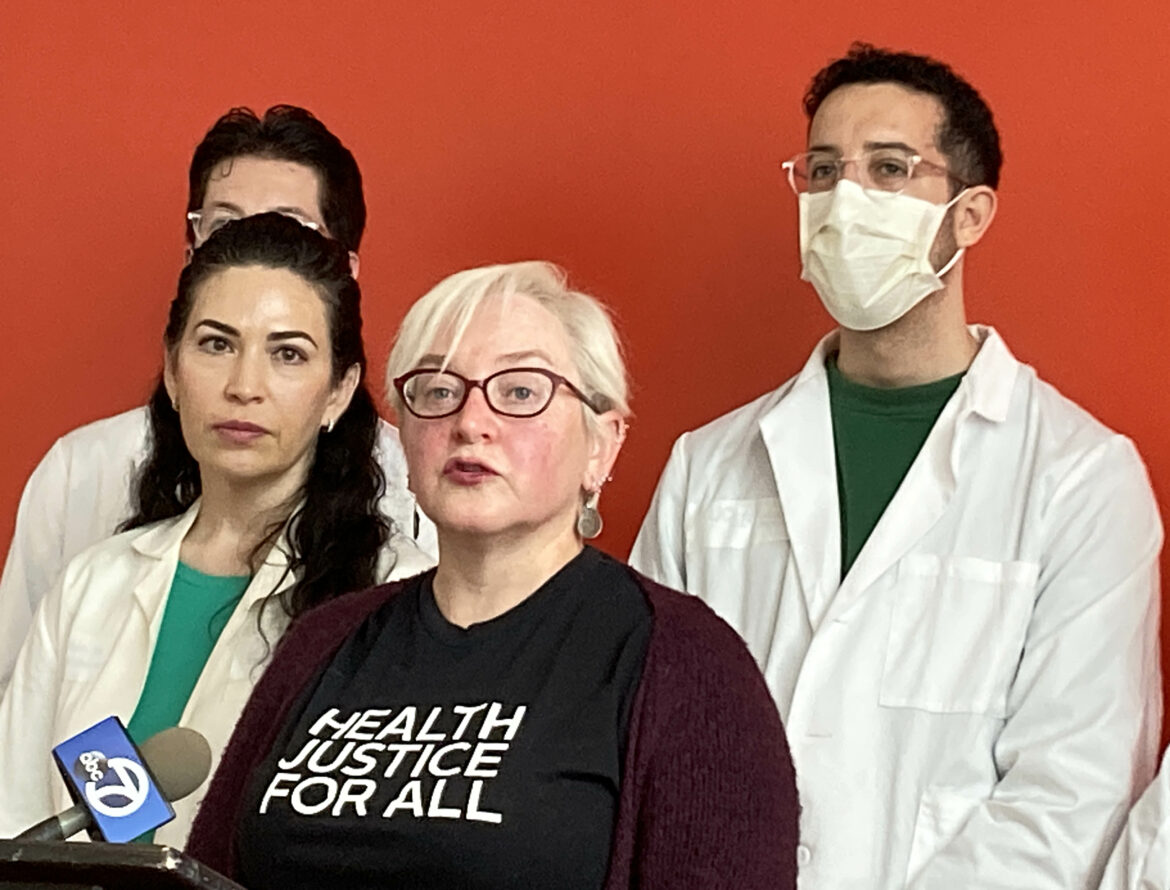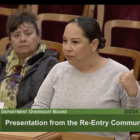This article is adapted from an episode of our podcast “Civic.” Click the audio player below to hear the full story.
Numerous drug policy experts and addictions specialists from across the country — as close as UCSF and as far away as Rhode Island — publicly oppose a San Francisco ballot measure that would compel adult welfare recipients to undergo drug screening before collecting cash benefits.
And efforts to publicize the measure have brought specialists who don’t always agree about addiction treatment practices to the same side of the debate.
Keith Humphreys, Stanford professor of psychiatry and behavioral sciences, has said San Francisco has been too permissive with people with substance use disorder.
That led a local Proposition F campaigner to believe that he was an ally, Humphreys said.
“It was sent to me by someone in politics in San Francisco asking me, you know, do I want to endorse this?” he said. “And the answer is no.
“Being poor is not a crime. If this is something that is important to do, we should be doing it with people who threaten public safety, and not people who need this money to eat and pay their rent.”
Mayor London Breed’s Proposition F — Illegal Substance Dependence Screening and Treatment for Recipients of City Public Assistance would require single adults aged 65 and under who have no dependent children and receive County Adult Assistance Program benefits to participate in drug screening, evaluation and treatment to be eligible for cash benefits.
Recipients who decline screening or treatment would be ineligible for monthly cash benefits of $105 for people experiencing homelessness and $697 for housed residents. Benefit recipients who lack housing would receive 30 days of guaranteed shelter access. Those in housing would receive 30 days of rent paid directly to a landlord, with potential extensions for eviction prevention.
Proposition F has the backing of some wealthy donors in the tech sector, most notably Chris Larsen, a tech billionaire best known for co-founding Ripple and a major donor to political groups Neighbors for a Better San Francisco, Progress SF and GrowSF.
Larsen has spent nearly $1 million on this election, including $250,000 on Proposition F, donations to various Democratic County Central Committee candidates running against incumbents, and $100,000 in one San Francisco Superior Court contest to unseat an incumbent judge.
Larsen is also a personal champion of Breed and her agenda.
“You’ve got a Board of Supervisors that doesn’t work with the mayor, that’s a huge problem,” Larsen said in an interview with Bloomberg News last fall. “And unfortunately, that can only be addressed in the ’24 election.”
A Failed Strategy
Breed said threatening to rescind cash benefits would compel low-income residents with substance use disorder into treatment. She announced the strategy last September after a plan to coerce people into treatment through arrests failed.
“The arrests that we’re making for public intoxication, people are not accepting help,” Breed said. “And so now it’s time to make sure that we are cutting off resources that continue to allow this behavior to occur without the accountability, without someone involved in a treatment program that could lead to a better life.”
According to retired Redondo Beach Police Lt. Diane Goldstein, the mistake San Francisco’s and other cities’ leaders make is that they don’t adequately fund programs that would effectively support public health, public safety and mental health.
Instead, she said, they “wait until things are so bad that they call the cops to fix the problem with the wrong set of tools.”
Goldstein is now executive director of the Law Enforcement Action Partnership, a group of police, prosecutors, judges and other criminal justice professionals focusing on drug policy and criminal justice.
“Frankly, I just don’t know if the public is ever going to understand it,” Goldstein said. “Because they don’t understand that law enforcement should have never been tasked with enforcing a public health issue going back years. But the reason we do is, we’re the only people that answered the phone in the middle of the night.”
Goldstein said there are positive ways to involve police officers in helping more people access substance use disorder treatment programs. For example, the San Francisco Police Department was involved in a program in 2017 that brought law enforcement officers, street teams, case managers, public health clinicians and justice system professionals together to enroll repeat low-level drug offenders into community-based health and social services as an alternative to jail and prosecution. But that was short-lived.
The Law Enforcement Assisted Diversion — aka LEAD and now called Let Everyone Advance with Dignity — was launched in 2011 by Seattle-based Purpose Dignity Action, then called the Public Defender Association, which responds to public safety issues by facilitating inter-agency coordination. It has since expanded throughout the country.
In 2017, San Francisco received $6 million to implement LEAD from the Board of State and Community Corrections. But it stumbled after two years despite showing significantly lowered rates of misdemeanor and felony arrests, and felony cases among enrollees.
One of the main problems was getting buy-in from law enforcement officers, according to an evaluation by the California State University, Long Beach, School of Criminology.
It was a major shift to go from arresting people to diverting them into social programs, according to interviews with officers and court personnel quoted in the report. As one officer said, “I’ve been around…cops for almost 30 years, and it’s not going to be like — it’s not going to be, push a button or snap your fingers and everybody is going to go, ‘Okay, we’ll do it different.’”
San Francisco Police Chief Bill Scott expressed willingness to revisit the program at a Police Commission meeting last June, but it’s unclear whether there have been efforts to revive it. The Police Department did not respond to inquiries about this subject.
Lisa Daugaard, co-executive director of Purpose Dignity Action, said leaders can no longer ignore the fact that coercing people into treatment for substance use disorders is counterproductive because it doesn’t address underlying circumstances.
“It comes from an understandable impulse to help people get better. That is not how people get better,” Daugaard said. “Imagine what happens if they don’t do that thing. So now you have people in an even more miserable situation than they are right now who definitely are going to be turning to the illicit economy to get their income. And that’s not good for anybody.”
She said she understands the pressures city leaders face regarding visible drug sales, use and addiction.
“The problem that we’ve got is that public officials under public pressure need something to point to that seems like action,” Daugaard said. “They don’t know how people get better, and that impulse to quick action can be very, very destructive.”
She said that’s why her organization “spends a ton of time” ensuring that their inter-agency approach visibly improves the situation on the streets for retail businesses and that police are satisfied with their recommendations.
Relapse Not Considered
San Francisco Human Services Agency Executive Director Trent Rhorer said last September that about 20% of the 5,200 people who collect County Adult Assistance Program benefits self-disclosed last year that they were suffering from substance use disorder.
“It’s a population that has not availed themselves of treatment,” and this measure would lead to a “positive change” in their lives, Rhorer said.
Brandon del Pozo, an assistant professor of medicine and public health at Brown University, where he conducts research on the drug epidemic and its intersection with policing and criminal justice, said Proposition F does not account for the fact that addiction is an inherently relapsing disease, even among those who willingly enter medically assisted treatment.
“The clinical odds of someone getting on the medication and staying on the medication are very low without repeated attempts,” del Pozo said.
He also applied his perspective as a 19-year veteran of the New York City Police Department and the former chief of police of Burlington, Vermont, where he organized the city’s response to the opioid crisis.
“The cop in me says that if you could get them to stay on for five years, and that’s the facts, try it. That is just not the world,” he said. “People will fail out of this and lose their assistance, lose what they need to survive.”
Addiction specialists agree that the measure does not address the circumstances surrounding harmful substance use.
Dr. Marlene Martin, UCSF associate professor and founding director of the addiction care team at San Francisco General Hospital, was among four medical professionals who gathered for a Feb. 2 press conference to speak out against Proposition F.
She said her patients have told her they use substances because of housing instability, trauma, poverty, discrimination and untreated mental illness. She added that threatening to halt or cut city benefits will erode the trust it takes for recipients to disclose their substance use and seek addiction treatment.
“I have seen addiction and overdose worsen when people lose support systems, and that is what Proposition F threatens to do,” Martin said.
Laura Thomas, senior director of HIV and harm reduction policy at the San Francisco AIDS Foundation, said at the Feb. 2 press conference that Proposition F does not increase access to substance use disorder treatment. And while her organization provides a path to recovery for numerous clients every year, she said, the city is reducing its funding.
“If the Human Services Agency wants to connect people to treatment, I highly recommend that instead of putting this wasteful and cynical initiative on the ballot, that they add a couple of linkage counselors to connect people to medications for opioid use disorder including buprenorphine and methadone,” Thomas said.
Legal Troubles on the Horizon
The measure could bring the city legal troubles. Mission Local reported Feb. 20 that attorney Kerianne Steele representing Service Employees International Union Local 1021 sent a letter to the city attorney claiming that Proposition F violates the Meyers-Milias-Brown Act, which mandates that an employer confer with union employees on matters related to employment conditions.
Steele says Proposition F would adversely affect employees since it would lead to increased workloads at a time when the mayor is calling for budget cuts despite staff shortages across the Human Services Agency. The letter states also that there could be an increase to threats against staff as recipients are denied benefits, yet the measure includes no provisions for increased security.
And, while the measure anticipates enrolling an estimated 1,700 new clients into treatment, the SEIU letter states that, as of its writing, San Francisco had only 46 treatment beds available, according to the city’s tracking system. Meanwhile, the mayor’s budget proposes to cut city funding for drug treatment and mental health services.
The letter demands that the Proposition F be removed from the ballot. But the deadline to do that passed in November, according to the San Francisco Department of Elections.










